The Westminster Dictionary of Theological Terms
SECOND EDITION
The Westminster Dictionary of Theological Terms
SECOND EDITION
Revised and Expanded
Donald K. McKim

2014 Donald K. McKim
Second Edition
Published by Westminster John Knox Press
Louisville, Kentucky
14 15 16 17 18 19 20 21 22 2310 9 8 7 6 5 4 3 2 1
All rights reserved. No part of this book may be reproduced or transmitted in any form or by any means, electronic or mechanical, including photocopying, recording, or by any information storage or retrieval system, without permission in writing from the publisher. For information, address Westminster John Knox Press, 100 Witherspoon Street, Louisville, Kentucky 40202-1396. Or contact us online at www.wjkbooks.com.
Scripture quotations from the New Revised Standard Version of the Bible are copyright 1989 by the Division of Christian Education of the National Council of the Churches of Christ in the U.S.A. and are used by permission.
The lists of abbreviations on pp. 36163 and 364 are from Richard N. Soulen and R. Kendall Soulen, Handbook of Biblical Criticism, 4th ed. (Louisville, KY: Westminster John Knox Press, 2011).
Cover design by Dilu Nicholas
Cover illustration: Kees Zwanenburg shutterstock.com
Library of Congress Cataloging-in-Publication Data
McKim, Donald K.
The Westminster dictionary of theological terms / Donald K. McKim. Second edition, revised and expanded.
pages cm
ISBN 978-0-664-23835-3 (paperback) ISBN 978-0-664-25976-1 (hardback) 1. TheologyDictionaries. I. Title.
BR95.M378 2014
230.03dc23
2013041195
 The paper used in this publication meets the minimum requirements of the American National Standard for Information SciencesPermanence of Paper for Printed Library Materials, ANSI Z39.48-1992.
The paper used in this publication meets the minimum requirements of the American National Standard for Information SciencesPermanence of Paper for Printed Library Materials, ANSI Z39.48-1992.
Most Westminster John Knox Press books are available at special quantity discounts when purchased in bulk by corporations, organizations, and special-interest groups. For more information, please e-mail .
It is a pleasure to provide this second edition of The Westminster Dictionary of Theological Terms. The original edition, published in 1996, has met with appreciation from a variety of users, especially seminary students. This has been gratifying. My hope has been to provide a guide to theological terms that will benefit users, particularly those with no formal backgrounds in the study of theology. I am grateful the book has been well received, particularly by those being introduced to theological studies for the first time. My bestand favorite!compliment on it was from a seminary student who wrote: I take my copy everywhere, except into the shower! May the tribe of such users increase!
This second edition is both revised and expanded. Some mistakes from the first edition have been corrected and some new features added. My hope is that these will enhance the usefulness of this volume. Most significantly, over a thousand theological terms new to the volume have found their way into this edition. This brings the total to nearly seven thousand terms. I trust these features will enhance the books usefulness and enable a new generation of students, pastors, and laity to find the joys of theological study.
I am grateful along the way to a number of people who have been helpful. In addition to the scholars who made suggestions for the first edition of this work, I thank especially David Jensen and Grace Ji-Sun Kim for suggestions of new terms, especially in the realms of contemporary and postcolonial theology. Their help has been particularly useful.
My appreciation also goes to David Dobson, Julie Tonini, and Daniel Braden of Westminster John Knox Press. David has encouraged this project from the start. Julie has done her always wonderful work of moving the project through production. Dan as my editor has provided a grand vision for the book and great support every step of the way. I am especially grateful for his splendidand ever-competenthelp.
My thanks also go to Gary Lee for an outstanding job of copyediting. His work has enhanced the book greatly.
In the preface to the first edition, I mentioned enjoying listening to the music of Michael Doucet & Beausoleil as I labored through the definitions. I was later able to present Michael Doucet with a copy of the book and express my thanks. He was perhaps amused, but was gracious and seemed pleased. I hope so!
This time I was boosted by music from Sirius XM radio, especially the 60s on 6; and other stations including the Grateful Dead channel, the 50s on 5, and the Bridge. If this kind of music is the soundtrack of our lives, my life has been enriched by the musicas well as by the theological terms the music has helped with as I tried to define them.
No book of mine is ever complete without mentioning the love and support of my family. For the blessed joys of life together I thank my wonderful wife, LindaJo, who has been my loving partner through our years of marriage. She brings meaning to all I try to do, and to her I express my deepest gratitude. Our fine sons, Stephen and Karl, were teenagers when the first edition of this book appeared. Now they are married and have careers. Stephen, his wife Caroline, and daughters Maddie and Annie bring us delights and happy times. So do Karl and his wife, Lauren. For them we are thankful beyond words. To my dear family, I gladly and gratefully dedicate this second edition.
As I mentioned in the preface to the first edition, the blessed visage of the great lexicographer, Dr. Samuel Johnson (170984), sketched by LindaJo, gazes down on me as I work at the computer. His definition of a lexicographer as a writer of dictionaries, a harmless drudge, continues to bring a smile, even as I labored to be that harmless drudge!
In this new edition, my continuing wish is that this volume will help us all enter more fully into the study of theology, which Karl Barth called the joyful science.
D. K. M.
Germantown, Tennessee
Third Sunday of Advent, 2013
Words are the building blocks for Christian theology. Through long centuries, Christian theological reflection has been expressed in words. Vocabularies have been built. Events have happened and words to describe them have been coined. The Christian church has worshiped, educated, and preached. It has passed on a tradition of faith. Theological movements have been born and have flourished, and some have died. Ecclesiastical bodies have functioned in history. Christians have sought spiritual growth and carried out ministries. The church has studied the Scriptures and adopted ethical stances. All this, and more, has happened. And words have been crucial to all these developments.
A number of years of teaching in theological seminaries have convinced me of the need for a volume that defines words which are important theological terms. A number of specialized dictionaries and encyclopedias are available to offer extended treatments of vocabularies for particular fields, for example, Bible, theology, church history, and worship. These are crucial resources. Yet todays theological vocabularies are wide-ranging and technical. Specialized works cannot attempt to be extensive. So there is also need for a wider, synthetic work that gives short, identifying definitions over a more comprehensive range of theological disciplines. This dictionary seeks to meet such a need.
The Westminster Dictionary of Theological Terms provides short, one- to three-sentence definitions of theological terms from some twenty-one theological disciplines. The more than 5,500 terms here are drawn from the following areas: Bible, American church history, church government, general church history, ethics, evangelicalism, feminist theology, fundamentalism, general religion, liberation theology, liturgical theology, Lutheran theology, ministry, philosophical theology, Protestant theology, Reformed theology, Roman Catholic theology, social-scientific terms, spirituality, theology, Wesleyan theology, and worship. While the volume is not deep, in the sense of delving into intricate theological discussions, it is broad in covering a wide waterfront in short compass. My hope is that this type of resource will fill an important niche in the theological literature while providing easy access to an expanse of theological terms.
Next page
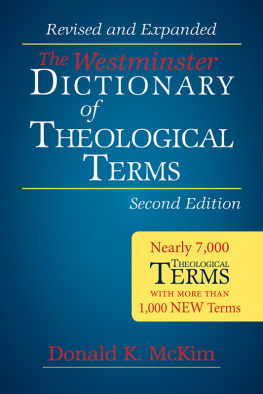
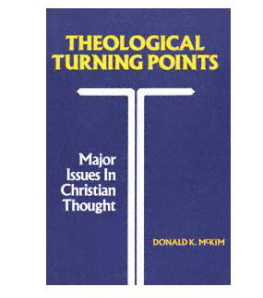
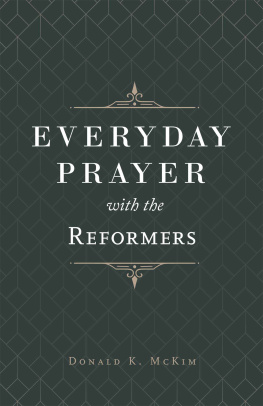

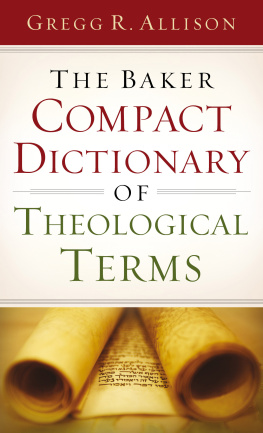
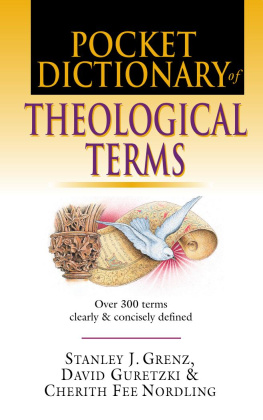
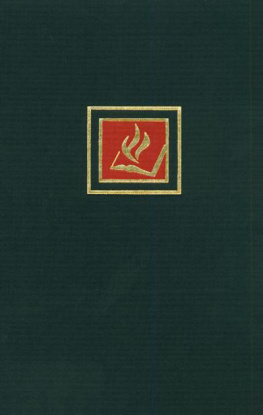
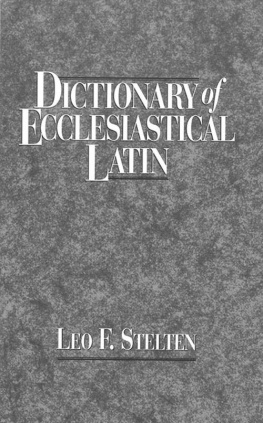
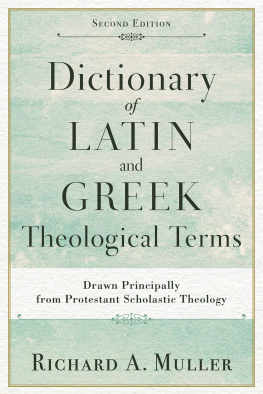
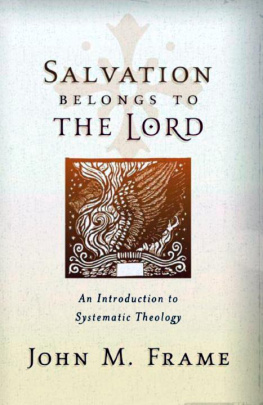

 The paper used in this publication meets the minimum requirements of the American National Standard for Information SciencesPermanence of Paper for Printed Library Materials, ANSI Z39.48-1992.
The paper used in this publication meets the minimum requirements of the American National Standard for Information SciencesPermanence of Paper for Printed Library Materials, ANSI Z39.48-1992.